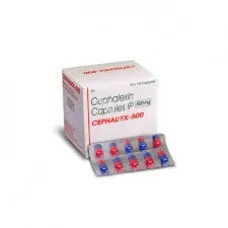Cephadex 500mg Cephalexin Oral tablets 500mg Cipla

- $1.00
- Price in reward points: 10
Tags: Cephalexin
Generic Keflex (Cephadex Capsules) - Product Information
Price per 1 tablet
Generic Keflex (Cephalexin capsules) is used for the treatment of Respiratory tract infections, Otitis media, Skin and skin structure infections, Bone infections and Genitourinary tract infections, including acute prostatitis when caused by susceptible strains of the designated microorganisms. Generic Keflex belongs to the Cephalosporin group of antibiotics.
Inorder to reduce the development of drug-resistant bacteria and maintain the effectiveness of Cephalexin (Generic Keflex) as well as all other antibacterial drugs, Generic Keflex should be used only to treat or prevent infections that are proven or strongly suspected to be caused by susceptible bacteria.
Cephadex capsules are manufactured by Cipla Ltd. in the strengths of 250 mg and 500 mg.
Name of the Drug
We supply original Cephadex capsules manufactured by Cipla Ltd.. Cephadex capsules are also known as Generic Cephalexin.
Manufacturer of Cephadex Capsules
Cipla Ltd.
Website: cipla.com
Active Ingredient present in Cephadex Capsules
The active ingredient present in Cephadex capsules is Cephalexin Monohydrate. Each Cephadex Capsule contains Cephalexin Monohydrate equivalent to 250 mg or 500 mg of Cephalexin.
Uses of Generic Keflex (Cephadex Capsules by Cipla)
Generic Keflex (Cephalexin Capsules) is used to treat infections caused by bacteria including upper respiratory infections, ear infections, skin infections, and urinary tract infections. Cephadex belongs to a group of drugs called Cephalosporin antibiotics which fights bacteria in the body. Cephadex, which is the generic name for Keflex contains the active ingredient Cephalexin Monohydrate equivalent to 250 mg or 500 mg of Cephalexin.
Generic Keflex (Cephalexin Capsules) - Dosage
Generic Keflex (Cephalexin Capsules) is administered orally. The dosage of Cephadex capsules is given below:
Adult Dosage of Cephalexin Capsules:
The adult dosage ranges from 1 to 4 g daily in divided doses. The usual adult dose is 250 mg every 6 hours. For the following infections, a dosage of 500 mg may be administered every 12 hours: streptococcal pharyngitis, skin and skin structure infections, and uncomplicated cystitis in patients over 15 years of age. Cystitis therapy should be continued for 7 to 14 days.
In the treatment of otitis media, clinical studies have shown that a dosage of 75 to 100 mg/kg/day in 4 divided doses is required.
Pediatric Patients:
The usual recommended daily dosage of Cephadex capsules for pediatric patients is 25 to 50 mg/kg in divided doses. For streptococcal pharyngitis in patients over 1 year of age and for skin and skin structure infections, the total daily dose may be divided and administered every 12 hours.
How to Use Generic Keflex (Cephalexin Capsules)
Take Cephalexin capsules exactly as it was prescribed for you. Do not use the medication in larger amounts, or use it for longer or shorter than recommended by your doctor. Your symptoms may get better before the infection is completely treated.
It will not treat a viral infection such as the common cold or flu.
Take the medicine with a full glass of water.
Generic Keflex can cause you to have unusual results with certain medical tests. Tell any doctor who treats you that you are using this medicine.
Take the missed dose as soon as you remember. If it is almost time for your next dose, skip the missed dose and take the medicine at your next regularly scheduled time. Do not take extra medicine to make up the missed dose.
Generic Keflex (Cephadex Capsules) - Contraindications
Generic Keflex (Cephadex capsules) is contraindicated in patients with known allergy to Cephalexin, any medicine in the Cephalosporin group of antibiotics or to any inactive ingredient present in Cephadex Capsules.
Cefalexin Side Effects
The most common side effects of Cefalexin capsules (Generic Keflex) are gastrointestinal (stomach area) disturbances and hypersensitivity reactions. Gastrointestinal disturbances include nausea, vomiting, and diarrhea. The most common being diarrhea. Dyspepsia, gastritis, and abdominal pain have also occurred. Hypersensitivity reactions include skin rashes, urticaria and angioedema.
Get emergency medical help if you have any signs of an allergic reaction including: hives, difficulty breathing, and swelling of your face, lips, tongue, or throat.
Call your doctor at once if you have any of these serious side effects:
• diarrhea that is watery or bloody
• seizure (convulsions)
• fever, sore throat, and headache with a severe blistering, peeling, and red skin rash
• pale or yellowed skin, dark colored urine, fever, confusion or weakness
• easy bruising or bleeding, unusual weakness
• confusion, agitation, hallucinations (seeing things that are not there)
• urinating less than usual or not at all
Less serious side effects of Cephadex capsules may include:
• mild nausea, vomiting, diarrhea
• dizziness, tired feeling
• joint pain
• vaginal itching or discharge
Overdose symptoms may include nausea, vomiting, stomach pain, diarrhea, and blood in your urine. This is not a complete list of side effects and others may occur. Call your doctor for medical advice about side effects.
Warnings & Precautions When Using Generic Keflex (Cephadex Capsules)
Do not use this medicine if you are allergic to Cephalexin (the active ingredient), or to other cephalosporin antibiotics, such as:
• cefaclor (Ceclor®)
• cefadroxil (Duricef®)
• cefdinir (Omnicef®)
• cefditoren (Spectracef®)
• cefixime (Suprax®)
• cefprozil (Cefzil®)
• ceftazidime (Fortaz®)
• cefuroxime (Ceftin®)
Before using this medicine, tell your doctor if you are allergic to any drugs (especially penicillin), or if you have:
• kidney disease
• liver disease
• a stomach or intestinal disorder such as colitis
• diabetes
• if you are malnourished
If you have any of these conditions, you may need a dose adjustment or special tests to safely take this medicine. Antibiotic medicines can cause diarrhea, which may be a sign of a new infection. If you have diarrhea that is watery or has blood in it, call your doctor. Do not use any medicine to stop the diarrhea unless your doctor has told you to.
Cephalexin During Pregnancy
Cephalexin capsules are classified by the US FDA as FDA pregnancy category B. FDA category B includes medications which have been taken by a large number of pregnant women and women of childbearing age without any proven increase in the frequency of malformations or other direct or indirect harmful effects on the foetus having been observed. Studies in animals have shown no risk to the fetus, however there are no sufficient studies conducted in humans. Patients should follow the advice of their doctor regarding use of Cephalexin during pregnancy. Your doctor will discuss the risks and benefits of using Cefalexin during pregnancy. Tell your doctor if you are pregnant or plan to become pregnant during treatment.
Cephalexin During Breastfeeding
Cefalexin passes into breast milk and may affect your baby. The excretion of Cefalexin in breast milk increased for up to 4 hours after a 500 mg dose was administered. The medication reached a maximum level of 4 mg/l, then decreased gradually, and had disappeared 8 hours after administration.
Caution should be exercised when cefalexin is administered to a nursing woman.Your doctor will discuss the risks and benefits of using Cefalexin when breastfeeding an infant. Do not use this medicine without telling your doctor if you are breastfeeding a baby.
Cephalexin and Alcohol
Cephalexin capsules can cause dizziness. This side effect could get worse if you take Generic Keflex (Cephalexin capsules) with alcohol or certain other medicines. Do not drive or perform other possibly unsafe tasks when undergoing treatment with Cephalexin capsules until you know how you react to it.
It is also well known that alcohol can interact with certain medicines, specially antibiotics . In combination with acute or chronic alcohol consumption, some antibiotics cause nausea, vomiting, headache, and possibly convulsions.
